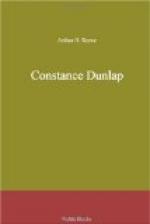“So have I,” she admitted, facing him; “but, do you know, sometimes I have thought that Malcolm Dodd is not your real name?”
“Not my real name?” he repeated.
“And that you are here for some other purpose than—just to rest. You know, you might be a detective.”
He had looked at her searchingly. Then in a burst of confidence, he had replied, “No, my name is not Dodd, as you guessed. But I am not a detective, as you suspected at first. I have been watching you because, ever since I heard your story here, I have been—well, not suspicious, but—attracted. You seem to me to have faced a great problem. I, too, have come to the parting of the ways. Shall I run or shall I fight?”
He had handed her a card without hesitation. It bore the name, “Murray Dodge, Treasurer, Globe Importing Company.”
“What do you mean?” she had asked quickly, hardly expecting an answer. “What have you done?”
“Oh, it is the usual trouble, I suppose,” he had replied wearily, much to her surprise. “I began as a boy in the company and ultimately worked myself up as it grew, until I became treasurer. To cut it short, I have used funds belonging to the company, lost them. I don’t need to tell you how a treasurer or a cashier can do that.”
Constance was actually startled. Was he what he represented himself to be? Or was he leading her on in this way to a confession of her own part, which she had covered so well, in the forgeries of her dead husband?
“How did you begin?” she asked tentatively.
“A few years ago,” he answered with a disconcerting lack of reserve, “the company found that we could beat our competitors by a very simple means. The largest stockholder, Mr. Dumont, was friendly with some of the customs officials and—well, we undervalued our goods. It was easy. The only thing necessary was to bribe some of the officials. The president of the company, Walton Beverley, put the dirty work on me as treasurer. Now you can imagine what that meant.”
He had fallen into a cynical tone again.
“It meant that I soon found, or, rather, thought I found, that every man has his price—some higher, some lower, but a price, nevertheless. It was my business to find it, to keep it as low as I could with safety. So it went, from one crooked thing to another. I knew I was crooked, but not as bad, I think, as the rest who put the actual work on me. I was unfortunate, weak perhaps. That is all. I tried to get mine, too. I lost what I meant to put back after I had used it. They are after me now, or soon will be—the crooks! And here I am, momentarily expecting some one to walk up quietly behind me, tap me on the shoulder and whisper, ‘You’re wanted.’”
Time had not softened the bitterness of Constance’s feelings. Somehow she felt that the world, or at least society owed her for taking away her husband. The world must pay. She sympathized with the young man who was appealing to her for friendship. Why not help him?




